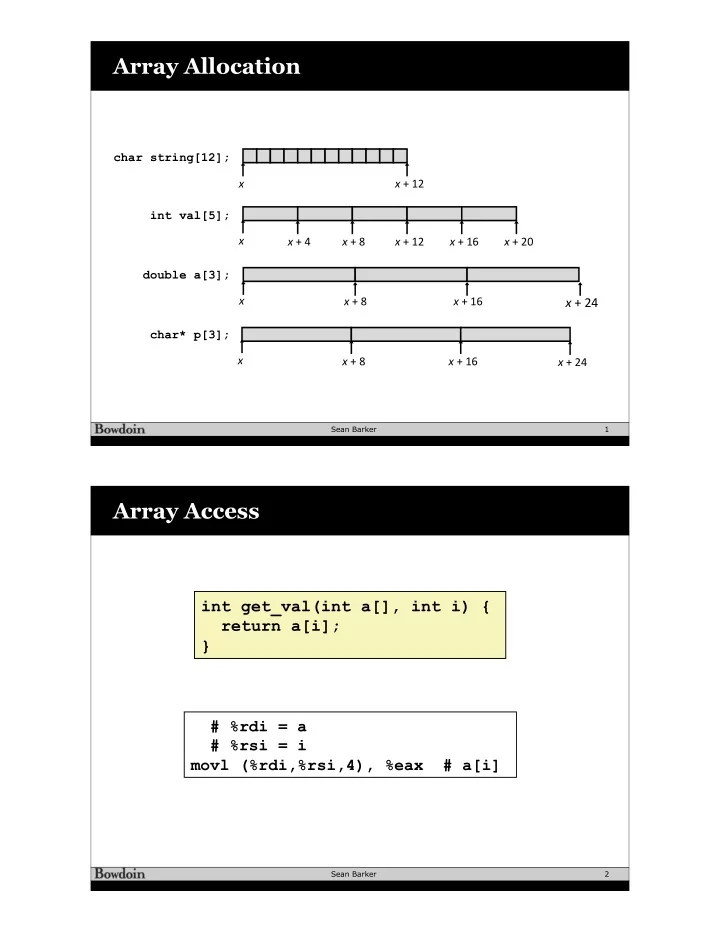

Array Allocation char string[12]; x x + 12 int val[5]; x x + 4 x + 8 x + 12 x + 16 x + 20 double a[3]; x x + 8 x + 16 x + 24 char* p[3]; x x + 8 x + 16 x + 24 Sean Barker 1 Array Access int get_val(int a[], int i) { return a[i]; } # %rdi = a # %rsi = i movl (%rdi,%rsi,4), %eax # a[i] Sean Barker 2
Array Looping void inc5(int a[]) { size_t i; for (i = 0; i < 5; i++) a[i]++; } # %rdi = a movl $0, %eax # i = 0 jmp .L3 # goto middle .L4: # loop: addl $1, (%rdi,%rax,4) # a[i]++ addq $1, %rax # i++ .L3: # middle cmpq $4, %rax # i:4 jbe .L4 # if <=, goto loop rep; ret Sean Barker 3 Multi-Level Array Example int* zips[3]; zips[0] = (int*) malloc(sizeof(int)*5); ... zips[1] 0 4 0 8 6 zips 16 20 24 28 32 36 zips[0] 160 36 0 4 0 1 1 16 168 36 40 44 48 52 56 zips[2] 56 176 0 4 0 3 2 56 60 64 68 72 76 Sean Barker 4
Multi-Level Array Example zips[1] 0 4 0 8 6 zips 16 20 24 28 32 36 zips[0] 160 36 0 4 0 1 1 16 168 36 40 44 48 52 56 zips[2] 176 56 0 4 0 3 2 56 60 64 68 72 76 int get_zip_digit (size_t index, size_t digit) { return zips[index][digit]; } salq $2, %rsi # 4*digit addq 160(,%rdi,8), %rsi # p = zips[index] + 4*digit movl (%rsi), %eax # return *p ret Sean Barker 5 Nested Array Example int zips[4][5]; 0 4 0 1 1 0 4 0 8 6 0 4 0 3 2 0 4 5 3 0 76 96 116 136 156 int* get_zip(int index) { return zips[index]; } # %rdi = index leaq (%rdi,%rdi,4),%rax # 5 * index leaq 76(,%rax,4),%rax # zips + (20 * index) Sean Barker 6
Structs r struct thing { int a[4]; long val; a val str char* str; }; 24 32 0 16 struct thing* p; // 8 bytes struct thing x; // 32 bytes p = malloc(sizeof(struct thing)); struct thing y; // form 1 x.val = 5; (*p).val = 7; // NOT p.val = 7 x.a[1] = 2; x.str = “hello”; // form 2 (preferred) p->val = 7; y = x; // copy full struct struct thing* p2; p2 = p; // just a pointer copy Sean Barker 7 typedef // give type T another name: U typedef T U; // defines a type “struct thing” with alias “thing” // T is “struct thing { ... }”, U is “thing” typedef struct thing { ... } thing; thing x; // can now omit “struct” from type name x.i = 5; thing* p = (thing*) malloc(sizeof(thing)); p->i = 3; Sean Barker 8
Linked List Example r struct node { int a[4]; int i; a i next struct node* next; }; 0 16 24 32 Element i void set_val (struct node* n, int val) { while (n) { int i = n->i; n->a[i] = val; n = n->next; } } .L1: # loop: movslq 16(%rdi), %rax # i = M[n+16] movl %esi, (%rdi,%rax,4) # M[n+4*i] = val movq 24(%rdi), %rdi # n = M[n+24] testq %rdi, %rdi # Test n jne .L1 # if !=0 goto loop Sean Barker 9 Data Alignment struct S1 { Unaligned Data char c; int i[2]; c i[0] i[1] v double v; p p+1 p+5 p+9 p+17 } *p; Aligned Data c 3 bytes i[0] i[1] 4 bytes v p+0 p+4 p+8 p+16 p+24 Mul3ple of 4 Mul3ple of 8 Mul3ple of 8 Mul3ple of 8 Sean Barker 10
Struct Data Alignment struct S2 { double v; int i[2]; char c; } *p; v i[0] i[1] c 7 bytes p+0 p+8 p+16 p+24 Mul$ple of 8 (largest alignment in struct) Sean Barker 11 Saving Space Put large data types first struct S4 { struct S5 { char c; int i; char c; int i; char d; char d; } *p; } *p; c 3 bytes i d 3 bytes i c d 2 bytes Sean Barker 12
Floating Point: YMM/XMM Registers n 16 single-byte integers n 8 16-bit integers n 4 32-bit integers n 4 single-precision floats n 2 double-precision floats n 1 single-precision float n 1 double-precision float Sean Barker 13
Recommend
More recommend